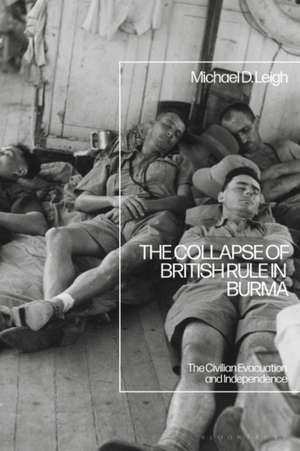The Collapse of British Rule in Burma: The Civilian Evacuation and Independence
Autor Michael D. Leighen Limba Engleză Paperback – 22 ian 2020
| Toate formatele și edițiile | Preț | Express |
|---|---|---|
| Paperback (1) | 225.77 lei 6-8 săpt. | |
| Bloomsbury Publishing – 22 ian 2020 | 225.77 lei 6-8 săpt. | |
| Hardback (1) | 716.80 lei 6-8 săpt. | |
| Bloomsbury Publishing – 25 iul 2018 | 716.80 lei 6-8 săpt. |
Preț: 225.77 lei
Preț vechi: 258.33 lei
-13% Nou
Puncte Express: 339
Preț estimativ în valută:
43.21€ • 44.63$ • 35.96£
43.21€ • 44.63$ • 35.96£
Carte tipărită la comandă
Livrare economică 26 martie-09 aprilie
Preluare comenzi: 021 569.72.76
Specificații
ISBN-13: 9781350147577
ISBN-10: 1350147575
Pagini: 304
Ilustrații: 15 bw illus
Dimensiuni: 156 x 234 x 20 mm
Greutate: 0.42 kg
Editura: Bloomsbury Publishing
Colecția Bloomsbury Academic
Locul publicării:London, United Kingdom
ISBN-10: 1350147575
Pagini: 304
Ilustrații: 15 bw illus
Dimensiuni: 156 x 234 x 20 mm
Greutate: 0.42 kg
Editura: Bloomsbury Publishing
Colecția Bloomsbury Academic
Locul publicării:London, United Kingdom
Caracteristici
Together with The Evacuation of Civilians from Burma: Analysing the 1942 Colonial Disaster, Leigh has provided the definitive account of Burmese evacuation
Notă biografică
Michael D. Leigh is Research Associate at SOAS, University of London, UK. He is the author of The Evacuation of Civilians from Burma: Analysing the 1942 Colonial Disaster (2014).
Cuprins
1. Introduction2. Major-General Wood and the Evacuation3. The Indian Tea Planters Association4. The Hukawng Valley Route: Travellers' Tales5. Fort Hertz and the Chaukkan Valley Route: The Case of Sir John Rowland6. The Bishop Strachan Orphans: A Tragic Case Study7. Eric T D Lambert: Saviour of Civilian Evacuees and the Chinese Fifth Army8. The Collection of Accounts of the Evacuation by Burma Oil Company Executives9. Dinjan, Margherita, Dimapur: Activities in the Indian Frontier Towns 10. Evacuation Camps in India 11. From Evacuation to Independence 1942-48: Political Fallout12. ConclusionBibliographyIndex
Recenzii
Leigh has pulled together an impressive array of sources, both official and personal (including numerous recollections and images still in private possession), which he has sifted through with great diligence and skill ... [Leigh] has produced a ?ne work, rich in detail and persuasive in its presentation, to illustrate where and how the tragedy of the evacuation unfolded. This makes the book a valuable contribution to the study of the Second World War in the East.
The tormenting and breathtaking adventures of the thousands of people from British Burma recreated by Michael Leigh is truly an extraordinary story of the India-Burma-China theater of World War II, largely unknown to the current world.
This is a compelling account of the destruction of British rule in Burma at the hands of the Japanese in the first months of 1942, of the evacuation of hundreds of thousands, Indians as well as Europeans, back to India in the wake of the collapse, and of the ultimately failed British attempt to re-establish effective control over Burma following the return of the colonial administration in mid-1945. Due weight is given to the politics of these events. But Michael Leigh's main focus is on the experience of individuals, from the highest levels of the colonial government, down through the middle ranks, to the vast numbers of the poorest Indians who had once found work in Burma. Meticulously researched and vividly written, this often harrowing account returns to history events and individuals far too long ignored or unknown.
With his engaging writing style and keen observations, Mike Leigh provided a rare account of the final days of the British rule in a remote corner of Burma. Chaos, cholera, death and human tragedy can teach us as important history lessons as wars and empire projects can, and Mike Leigh wonderfully brought out humanistic elements of the known past. A claim for a long mirror from a British elite evacuee tells as much important a story as a treaty. I hope this book will usher in more histories from below to do justice for the forgotten evacuees of the 1942 exodus, i.e. Indians and locals.
The tormenting and breathtaking adventures of the thousands of people from British Burma recreated by Michael Leigh is truly an extraordinary story of the India-Burma-China theater of World War II, largely unknown to the current world.
This is a compelling account of the destruction of British rule in Burma at the hands of the Japanese in the first months of 1942, of the evacuation of hundreds of thousands, Indians as well as Europeans, back to India in the wake of the collapse, and of the ultimately failed British attempt to re-establish effective control over Burma following the return of the colonial administration in mid-1945. Due weight is given to the politics of these events. But Michael Leigh's main focus is on the experience of individuals, from the highest levels of the colonial government, down through the middle ranks, to the vast numbers of the poorest Indians who had once found work in Burma. Meticulously researched and vividly written, this often harrowing account returns to history events and individuals far too long ignored or unknown.
With his engaging writing style and keen observations, Mike Leigh provided a rare account of the final days of the British rule in a remote corner of Burma. Chaos, cholera, death and human tragedy can teach us as important history lessons as wars and empire projects can, and Mike Leigh wonderfully brought out humanistic elements of the known past. A claim for a long mirror from a British elite evacuee tells as much important a story as a treaty. I hope this book will usher in more histories from below to do justice for the forgotten evacuees of the 1942 exodus, i.e. Indians and locals.
